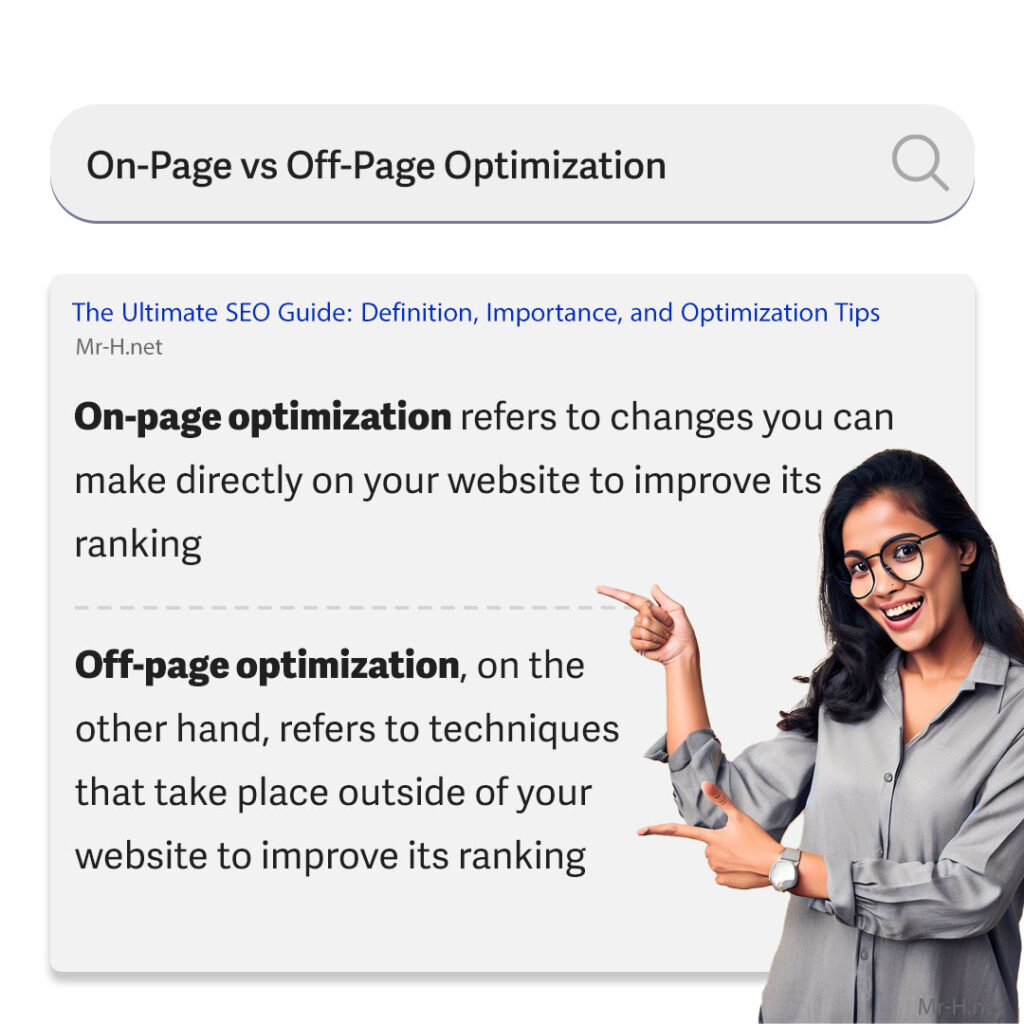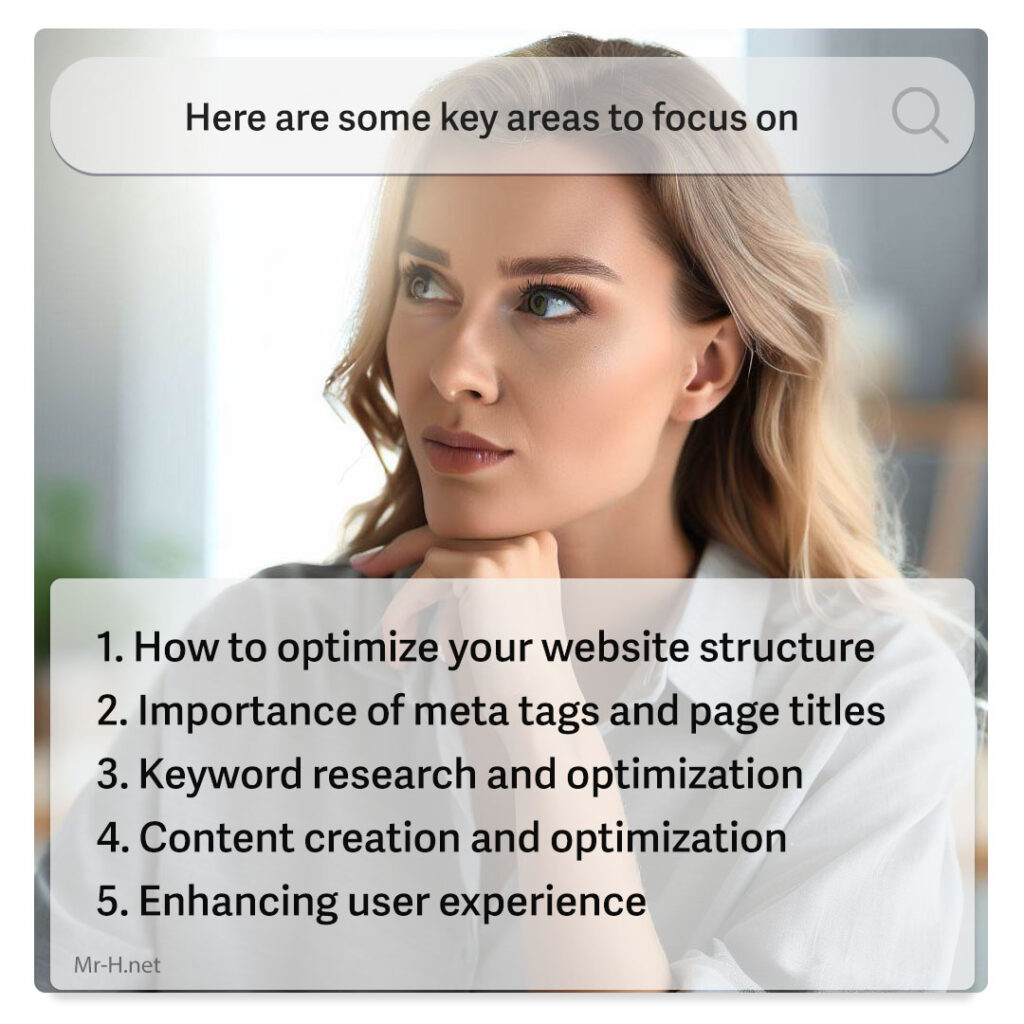Welcome to the ultimate guide to SEO!
If you’re looking for ways to boost your website’s visibility, increase traffic, and drive more sales, you’ve come to the right place.
We understand how overwhelming the world of SEO can be, which is why we’re here to help you navigate through it.
Did you know that:
- 75% of users never scroll past the first page of search results?
- 60% of all organic clicks go to the top three organic search results?
- Websites that appear on the first page of search results receive 91.5% of Google traffic.
- Do search engines drive 93% of all website traffic?
In this comprehensive guide,
we’ll take you through everything you need to know about SEO, from the basics to the more advanced strategies.
We’ll provide you with practical tips and techniques to optimize your website and improve your search engine rankings.
By the end of this article,
you’ll have a clear understanding of what SEO is, why it’s important for your business, and how to implement the best SEO practices to achieve your goals.
Whether you’re a beginner or a seasoned SEO professional, this guide will provide you with valuable insights and actionable advice to help you succeed.
So, if you’re ready to take your website to the next level and achieve your business objectives, keep reading!
Introduction: Unlocking the Power of SEO for Your Business
Are you looking to boost your website’s visibility, drive more traffic, and increase sales?
Then you’ve come to the right place!
In today’s digital age, having a strong online presence is essential for the success of any business.
And one of the most effective ways to achieve this is through Search Engine Optimization (SEO).
What is SEO and Why It’s Important for Businesses?
SEO is the process of optimizing your website to improve its ranking on search engine results pages (SERPs).
The higher your website ranks on SERPs, the more likely it is that potential customers will find your site and engage with your business.
As more and more consumers turn to the internet to research products and services, SEO has become increasingly important for businesses of all sizes and industries.
By implementing effective SEO strategies, businesses can increase their online visibility, reach a wider audience, and ultimately drive more traffic and sales.
Brief Overview of the Benefits of SEO
The benefits of SEO are numerous and far-reaching. By optimizing your website for search engines, you can:
- Increase website traffic and attract new customers
- Build brand awareness and establish credibility
- Improve user experience and engagement
- Boost sales and revenue
- Stay ahead of the competition
The Goal of this Blog Post
The goal of this comprehensive guide is to provide you with practical tips and techniques for implementing effective SEO strategies on your website.
Whether you’re new to SEO or a seasoned professional,
this guide will help you navigate the complex world of SEO and take your online presence to the next level :-).
Understanding the Basics of SEO
If you’re new to the world of SEO, it can seem overwhelming at first. However, understanding the basics is crucial to developing a successful strategy for your website.
Here are the key components of SEO that you should be aware of:
What is Search Engine Optimization?
Search engine optimization (SEO) is the practice of optimizing your website to rank higher on search engine results pages (SERPs) for relevant keywords.
The goal of SEO is to improve the quantity and quality of organic (unpaid) traffic to your site.
On-Page vs Off-Page Optimization
There are two main categories of SEO: on-page and off-page optimization.
On-page optimization refers to changes you can make directly on your website to improve its ranking,
such as:
- optimizing your content for target keywords
- optimizing your page titles and meta descriptions
- improving your site’s loading speed
- Optimizing images
- Implementing internal linking
- Writing quality content
- Using header tags effectively
Off-page optimization, on the other hand, refers to techniques that take place outside of your website to improve its ranking,
such as:
- Guest blogging on industry-relevant websites
- Participating in online forums and communities
- Creating shareable infographics and visual content
- Getting listed in online directories and local business listings
- Hosting and participating in webinars and online events
- Conducting outreach to relevant influencers for collaboration opportunities
- Building partnerships and sponsorships with other businesses or organizations
- Creating and promoting high-quality, shareable video content
- Contributing to online interviews or expert roundups
- Running and promoting online contests or giveaways
- increasing social media engagement
Key Components of a Successful SEO Strategy
In order to have a successful SEO strategy, it’s important to understand that it’s not just about one specific tactic or technique.
Instead, it requires a holistic approach that involves a variety of components working together to achieve the desired results.
These components can include:
- Keyword Research:
Identifying the right keywords to target based on your business goals and the search behavior of your target audience.
- Content Optimization:
Ensuring that your website’s content is high-quality, relevant, and optimized for your target keywords.
- On-Page Optimization:
Making changes to your website’s structure, metadata, and other elements to make it more search engine-friendly.
- Off-Page Optimization:
Building high-quality backlinks from reputable sources and increasing social media engagement to improve your website’s authority and credibility.
- Analytics and Reporting:
Regularly monitoring your website’s performance using tools like Google Analytics and reporting on the success of your SEO strategy.
By understanding these key components of SEO, you’ll be better equipped to develop a successful strategy for your website and improve its ranking on search engine results pages.
On-Page Optimization:
On-page optimization is the process of optimizing individual web pages to rank higher and earn more relevant traffic in search engines.
Here are some key areas to focus on:
How to optimize your website structure:
Use a clear and organized website structure with well-defined categories and subcategories.
Include an easy-to-use navigation menu and a search bar.
Ensure that your website is mobile-friendly and has fast loading times.
Importance of meta tags and page titles:
Include meta tags such as title tags and meta descriptions that accurately describe the content on the page.
Use keywords in your title tags and meta descriptions to improve search engine visibility.
Keep title tags under 60 characters and meta descriptions under 155 characters.
Keyword research and optimization:
Use keyword research tools to find relevant and high-traffic keywords to target.
Optimize your content and meta tags with the chosen keywords but avoid overusing them to avoid keyword stuffing.
Use long-tail keywords, questions, and related phrases to expand your content and increase your reach.
Content creation and optimization:
Create high-quality, unique, and engaging content that provides value to the user.
Use subheadings, bullet points, and images to break up the text and make it easier to read.
Optimize the content with the target keywords but prioritize the user’s experience over search engine rankings.
Enhancing user experience:
Use internal linking to make it easier for users to navigate your website and find relevant content.
Ensure that your website is easy to use, accessible, and visually appealing.
Keep your website up-to-date and provide fresh content to keep users engaged and encourage return visits.
By optimizing your website’s on-page factors, you can improve its relevance, usability, and visibility in search engines.
Off-Page Optimization:
Off-page optimization refers to the actions taken outside of your website to improve its visibility and ranking on search engines.
Here are some key areas to focus on:
Link building and its importance:
Link building is the process of acquiring backlinks to your website from other reputable websites.
Backlinks are important because they are one of the most significant factors in search engine ranking algorithms.
Some ways to build backlinks include:
- Guest blogging
- Broken link building
- Reaching out to websites in your niche to collaborate on content
Building a diverse backlink profile:
A diverse backlink profile includes links from various sources, such as:
- Social media
- Blogs
- Directories
- Industry-specific websites
A diverse backlink profile can improve your website’s authority and ranking in search engines.
However,
it’s important to avoid building too many backlinks too quickly or using spammy tactics that could lead to penalties from search engines.
Social media optimization:
Social media can be a powerful tool for:
- Increasing brand awareness
- Building relationships with customers
- Driving traffic to your website
Use social media to share your content, engage with your followers, and build a community around your brand.
Optimize your social media profiles with relevant keywords, images, and descriptions.
Reputation management:
Reputation management is the process of monitoring and managing your online reputation.
Some key steps for reputation management include:
- Responding to reviews, comments, and feedback in a timely and professional manner
- Monitoring your brand mentions
- Addressing any negative sentiment to maintain a positive online reputation
By implementing effective off-page optimization strategies, you can increase the visibility and authority of your website, attract more traffic, and improve your search engine rankings.
The Impact of SEO on Your Business:
Search Engine Optimization (SEO) can have a significant impact on your business by improving your online visibility, driving traffic to your website, and increasing conversions and sales.
Here are some key ways in which SEO can benefit your business:
How SEO can drive traffic to your website
Search engine optimization (SEO) is a powerful tool for driving traffic to your website.
With the right SEO strategies in place, SEO can help your website rank higher in search engine results pages (SERPs), making it more visible to potential customers who are searching for products or services like yours.
By optimizing your website’s content, meta tags, and other on-page elements for target keywords and phrases, you can improve your chances of ranking higher in SERPs.
This can result in increased organic traffic to your website, as more people are able to find you online.
As your website gains visibility, you’ll also be able to build brand awareness and authority in your industry, which can lead to more opportunities to convert visitors into customers.
Overall, a well-executed SEO strategy can be a powerful driver of website traffic and business growth
Increased brand recognition and credibility
When your business appears at the top of search engine results pages, potential customers are more likely to recognize and remember your brand.
This increased exposure can help to establish your business as a credible and authoritative source of information in your industry, leading to increased trust and credibility among consumers.
For example,
a law firm that consistently ranks at the top of search engine results pages for relevant keywords may be perceived as more credible and trustworthy than a law firm that does not rank as highly.
As a result, potential clients may be more likely to choose the higher-ranking law firm when searching for legal services online.
Improved user experience and engagement
Search engine optimization (SEO) not only helps to improve your website’s visibility in search engine results pages (SERPs), but it can also enhance the overall user experience (UX) of your website.
A website that is well-optimized for search engines tends to load faster, have better navigation, and be more mobile-friendly.
This, in turn, can improve user engagement, reduce bounce rates, and increase the time visitors spend on your site.
By providing high-quality and relevant content, visitors are more likely to find what they are looking for on your website, which can lead to higher conversion rates and ultimately more revenue for your business.
For example,
a retail business that sells clothing online may optimize their website for search engines by including relevant keywords in their product descriptions and meta tags, ensuring their website is mobile-friendly and easy to navigate, and providing high-quality images and detailed product information.
By doing so, they not only improve their website’s visibility in search engine results, but they also enhance the user experience of their customers, leading to increased engagement, higher conversion rates, and ultimately, more sales.
Increased conversions and sales:
By driving more traffic to your website and improving the user experience for website visitors, SEO can also help to increase conversions and sales.
By improving your website’s visibility and credibility, you can build trust with potential customers and provide them with a positive user experience that can lead to more sales.
Overall,
SEO can have a significant impact on your business by improving your online visibility, driving more traffic to your website, and increasing conversions and sales.
By investing in SEO and optimizing your website for search engines, you can establish your business as a credible source of information and attract more potential customers to your website.
Measuring and Analyzing Your SEO Efforts
Measuring and analyzing your SEO efforts is crucial to understanding the impact of your SEO strategies and identifying areas for improvement.
Here are some key steps to effectively measure and analyze your SEO efforts:
Setting and tracking SEO goals:
Before you can measure the success of your SEO efforts, it’s important to set specific and measurable SEO goals.
These goals should align with your overall business objectives and should be tracked regularly to evaluate your progress and make necessary adjustments.
Understanding and using Google Analytics:
Google Analytics is a powerful tool for measuring and analyzing the performance of your website.
It can provide insights into website traffic, user behavior, and other key metrics that are essential for understanding the effectiveness of your SEO strategies.
By understanding how to use Google Analytics, you can identify areas for improvement and make data-driven decisions to optimize your website for search engines.
Analyzing your search engine rankings:
Monitoring your search engine rankings is a critical part of measuring the success of your SEO efforts.
By tracking your rankings for targeted keywords and phrases, you can evaluate the effectiveness of your SEO strategies and make adjustments as needed.
There are a variety of tools available for tracking search engine rankings, including Google Search Console, SEMrush, and Ahrefs.
Key metrics for measuring the success of your SEO efforts:
There are several key metrics that can be used to measure the success of your SEO efforts, including:
-
Organic traffic: The number of visitors to your website from organic search results.
-
Click-through rate (CTR): The percentage of users who click on your website link from search engine results.
-
Conversion rate: The percentage of website visitors who take a desired action, such as making a purchase or filling out a contact form.
-
Bounce rate: The percentage of website visitors who leave your website after viewing only one page.
-
Keyword rankings: Your website’s position in search engine results for targeted keywords and phrases.
By regularly tracking these metrics and analyzing your website performance, you can make data-driven decisions to optimize your website for search engines and improve your online visibility.
Common SEO Mistakes to Avoid:
While SEO can be a powerful tool for improving your online visibility and driving traffic to your website, there are several common mistakes that businesses often make that can hinder their SEO efforts.
Here are some common SEO mistakes to avoid:
Overlooking on-page optimization:
On-page optimization refers to the practices used to optimize individual web pages in order to rank higher and earn more relevant traffic in search engines.
It includes factors such as optimizing title tags, meta descriptions, and header tags.
Failing to optimize your web pages can prevent search engines from accurately understanding your content and can result in lower search engine rankings.
Ignoring mobile optimization:
With more and more people accessing the internet from mobile devices, optimizing your website for mobile is crucial for SEO success.
Ignoring mobile optimization can result in poor user experience, which can lead to a higher bounce rate and lower search engine rankings.
Overusing keywords:
While incorporating targeted keywords and phrases is an important part of SEO, overusing them can be counterproductive.
Search engines can penalize websites for keyword stuffing, which can result in lower search engine rankings and decreased visibility.
Not building high-quality backlinks:
Backlinks are links from other websites that point to your website.
They are an important factor in search engine algorithms and can help to increase your website’s authority and credibility.
Not building high-quality backlinks can result in lower search engine rankings and decreased online visibility.
Not regularly updating your content:
Search engines favor websites that provide fresh and relevant content.
Failing to regularly update your website with new content can result in lower search engine rankings and decreased online visibility.
By avoiding these common SEO mistakes and implementing best practices for
- on-page optimization
- mobile optimization
- keyword usage
- backlink building
- and content updating
you can improve your website’s visibility and drive more organic traffic to your website.
The Future of SEO:
SEO is a constantly evolving field, and businesses that stay ahead of emerging trends and developments can gain a significant competitive advantage.
Here are some key areas to watch in the future of SEO:
Emerging SEO trends:
SEO is becoming increasingly focused on user experience and engagement, and this trend is likely to continue in the future.
Other emerging trends include the importance of video content, the use of featured snippets and answer boxes, and the rise of visual search.
Artificial intelligence and SEO:
As artificial intelligence (AI) becomes more sophisticated, it is likely to play an increasingly important role in SEO.
AI can help businesses to automate and optimize their SEO strategies, by analyzing large amounts of data and identifying trends and patterns that can inform content and keyword strategies.
The impact of voice search:
Voice search is rapidly gaining popularity, with an increasing number of consumers using voice assistants such as Siri and Alexa to search for information online.
This trend has significant implications for SEO, as businesses will need to optimize their content and keyword strategies for natural language queries.
The importance of local SEO:
As more consumers use mobile devices to search for local businesses, local SEO is becoming increasingly important.
Businesses that prioritize local SEO strategies, such as optimizing their Google My Business listing and building local backlinks, can gain a significant competitive advantage in their local market.
Overall,
the future of SEO is likely to be focused on user experience, engagement, and the use of new technologies such as AI and voice search.
By staying ahead of emerging trends and developments, businesses can optimize their SEO strategies and gain a competitive advantage in their industry.
Conclusion
In today’s digital age,
SEO is more important than ever for businesses looking to gain a competitive edge in their respective industries.
In this article,
we’ve covered the fundamentals of SEO and provided insights into the best practices for optimizing your website for search engines.
By following these best practices, you can improve your website’s visibility and attract more targeted traffic.
Benefits of Investing in SEO
Investing in SEO can have a significant impact on the success of your business.
With the right SEO strategies, you can:
- Improve your website’s search engine rankings
- Increase organic traffic
- Generate more leads and sales
Whether you’re a small business owner or a large enterprise, SEO can help you achieve your business goals and drive growth.
Time to Get Started
If you haven’t yet started your SEO journey, now is the time to get started.
By implementing the best practices outlined in this article, you can make your website more search-engine friendly and improve your online visibility.
Whether you’re looking to optimize your website for local search or expand your reach through voice search, the future of SEO is full of opportunities for growth and success.
We hope this article has been helpful in providing you with the information you need to get started with SEO.
If you have any questions or would like to learn more about how to improve your website’s search engine rankings, don’t hesitate to reach out to us.
Our team of SEO experts can help you develop and implement a custom SEO strategy that meets your specific needs and drives results.
Contact us today to learn more!
Frequently asked questions
What is SEO and why is it important?
SEO stands for search engine optimization, which is the process of optimizing a website to improve its visibility and ranking on search engine results pages.
It is important because it helps businesses attract more organic traffic, increase brand awareness, generate more leads and conversions, and improve their overall online reputation.
What are the different components of SEO?
The article mentions three main components of SEO: on-page optimization, off-page optimization, and technical optimization.
What is on-page optimization and how does it work?
On-page optimization involves optimizing individual web pages on a website to improve their visibility and rank higher on search engine results pages.
This involves optimizing various on-page elements such as page titles, meta descriptions, header tags, and content quality, among others.
What is off-page optimization and how does it work?
Off-page optimization focuses on improving a website’s authority and relevance by building links from external sources, such as other websites, social media platforms, and directories.
This includes strategies such as link-building, social media marketing, and online reputation management.
What is technical optimization and how does it work?
Technical optimization involves optimizing a website’s technical structure and functionality to improve its crawlability, indexability, and user experience.
This includes optimizing elements such as page speed, mobile-friendliness, schema markup, and XML sitemaps.
What is keyword research and why is it important for SEO?
Keyword research involves identifying relevant and high-traffic keywords related to a business’s products or services and then optimizing their website’s content accordingly.
It is important for SEO because it helps businesses target the right audience and improve their visibility on search engine results pages.
What is link building and why is it important for SEO?
Link building is the process of creating links from other high-quality websites to a website, with the goal of establishing the website’s authority and relevance in the eyes of search engines.
It is important for SEO because it can help improve a website’s ranking and visibility on search engine results pages.
What are some common technical SEO issues that can affect a website’s ranking?
Some common technical SEO issues include slow page speed, broken links, duplicate content, improper use of robots.txt, and poor site architecture.
What is the difference between white hat and black hat SEO?
White hat SEO refers to ethical and legitimate SEO practices that comply with search engine guidelines, while black hat SEO refers to manipulative and spammy practices that can result in penalties or bans from search engines.
How can businesses measure the success of their SEO efforts?
Businesses can use a variety of tools, such as Google Analytics and Search Console, to track their website’s traffic, rankings, and engagement metrics, and then adjust their SEO strategy accordingly.



